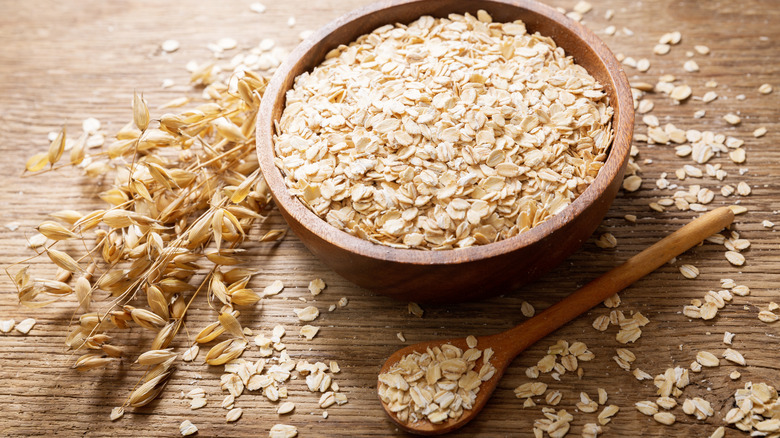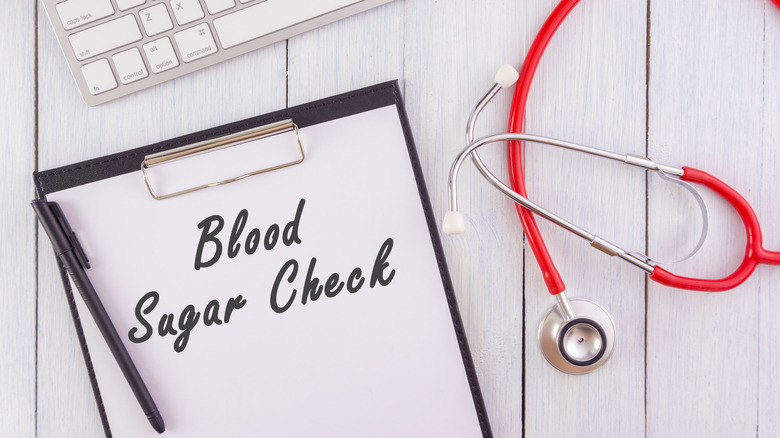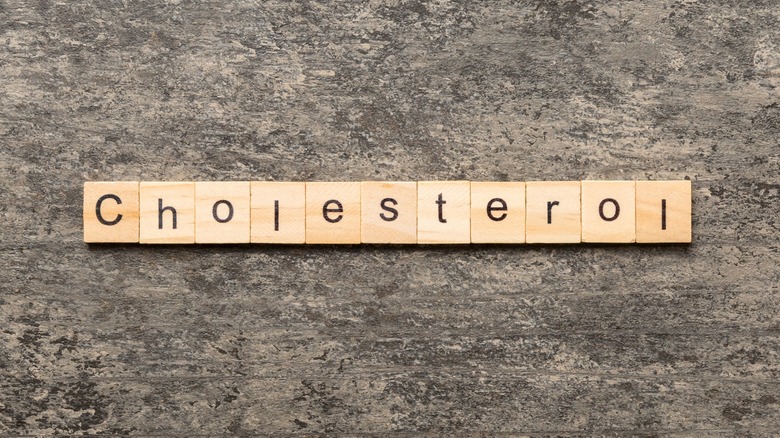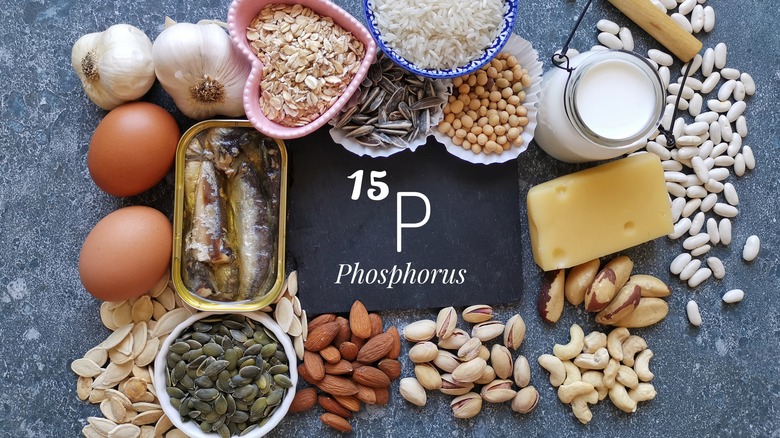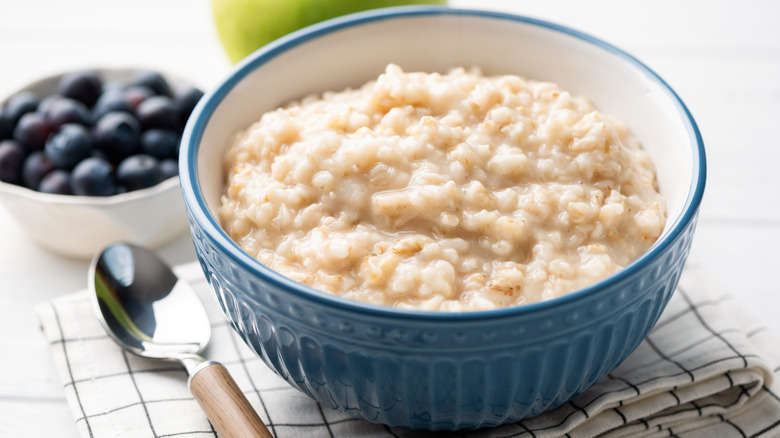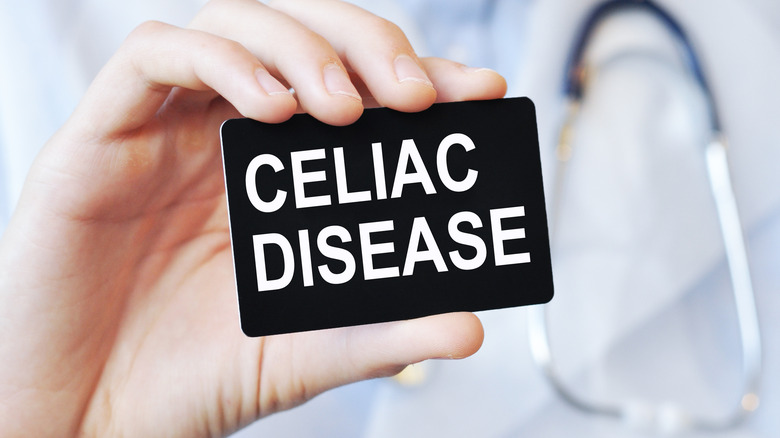When You Eat Oats Every Day, This Is What Happens To You
Think back to the last time you ate oats. Was it a warm bowl of oatmeal? Or maybe you had a splash of oat milk in your coffee. Perhaps it was something a bit more subtle, like a slice of bread made in part from oats. Whatever it was, oats are very common and can offer a host of potential health benefits. However, they're not necessarily for everyone.
As Harvard T.H. Chan School of Public Health explains, oats are actually seeds that come from a variety of grass and are classified as a cereal grain. Like many foods, oats can be processed in different ways, which can affect not just how they're cooked but also their nutritional value. For example, quick or instant oats are designed to cook faster than other oat products like steel-cut oats, and they often contain added sugar. The bottom line is it takes a little shopping around to find the best oat product to fit your needs. But the flip side is that oats are versatile enough to be used in a variety of recipes.
Of course, before you incorporate more or less of any food into your diet, it's important to speak with a health care professional like a nutritionist. After all, everyone's health needs are different, and what might be a positive addition to one person's meal plan could cause health issues for someone else. Additionally, a professional can also help with portion control and recommending which oat products are your best choices.
Your gut health might improve
It's difficult to talk about oats without discussing one of the most well-known oat products: oatmeal. But this common breakfast food isn't always a crowd pleaser. For instance, Candida Rebello, director of the nutrition and chronic disease research program at Louisiana State University's Pennington Biomedical Research Center in Baton Rouge, described on the American Heart Association's website that oatmeal as has a "kind of sliminess." However, even if you're not the biggest fan of oatmeal, you might want to give this oat food another try, especially if you have digestive concerns.
Oats contain a type of soluble fiber known as beta-glucan — and in fact, this beta-glucan is part of what gives oatmeal its sticky texture. Okay, but what does any of this have to do with gut health? Well, because oatmeal contains beta-glucan, it helps food move through your digestive tract. Specifically, it's great for helping undigested food move deeper into your digestive system to help nourish its bacteria.
Yes, as the American Heart Association points out, there are trillions of friendly bacteria living in the human gut, and keeping these microscopic organisms healthy can have a positive impact on multiple areas of the body, including the brain and the nervous system. In addition, Rebello notes that oatmeal's beta-glucan content can help one "feel fuller longer," which can aid with weight management.
Your blood sugar might be more steady
If you were to ask a group of people what's the first thing they think of when they hear the word "diabetes," chances are at least some of the group would say "blood sugar." But while tracking and monitoring blood sugar levels is important for diabetics, even someone without this medical condition can benefit from keeping their blood sugar levels steady. And if you guessed that oats might help, you'd be absolutely right.
Before we go any further, it's important to understand that diabetes involves the body's ability to process glucose (via the American Diabetes Association). A non-diabetic's body produces a hormone called insulin, which allows the body's cells to take in glucose. But a diabetic's body either isn't producing the insulin needed to do this (a condition known as type 1 diabetes) or is unable to properly use the insulin it produces (type 2 diabetes). In either case, a person who is diabetic typically has higher-than-normal levels of glucose in their blood. However, it's very common for a person to develop prediabetes where they have elevated blood glucose levels. And this condition can become type 2 diabetes.
The good news is WebMD notes that the soluble fiber found in foods like oatmeal can help keep blood sugar levels from spiking, which can be beneficial for both diabetics and prediabetics. Additionally, oats and oat bran might also help someone with diabetes reduce "bad" cholesterol.
Your bowels could be affected
It can be embarrassing to talk about the bowels and bowel movements. But there's no denying that well-functioning bowels are essential for one's overall good health, and oats might be a good choice for a bowel-healthy diet. However, that's not always the case.
But first, let's talk about the potential positive impact oats can have on the bowels. According to the Mayo Clinic, fiber like the kind found in oats can help make one's stool heavier and softer. This combination makes it easier for the bowels to move and pass the stool. So, it's not surprising that fiber could be beneficial for someone either with constipation or loose stool. Furthermore, the fiber in oats might reduce the chances of developing diverticular disease, where small pouches form in the colon.
Although eating oats can be good for the bowels, The Food Treatment Clinic notes that oats can sometimes trigger problems for someone with irritable bowel syndrome (IBS). Now, this can be a little confusing since, as Johns Hopkins Medicine explains, a common way patients with IBS try to manage their symptoms is by avoiding foods that are high in fermentable oligosaccharides, disaccharides, monosaccharides, and polyols (or what are simply called high FODMAP foods). But while oats are categorized as low FODMAP, they do contain fiber and resistant starches, both of which can be problematic for IBS. So, if you're experiencing IBS, you might want to keep a food journal to share with your health care professional.
Your cholesterol levels could improve
Chances are you've seen products adverting that they're good for one's heart because they contain oats. And, yes, oats can be beneficial for the heart in more than one way, including helping to lower cholesterol. But while managing one's cholesterol is important, there's more to this medical concern than "cholesterol is bad."
As the Cleveland Clinic explains, technically cholesterol in and of itself isn't bad. In fact, your body needs cholesterol to perform functions like creating hormones and the membranes of your body's cells. But when you have high levels of what's known as LDL cholesterol (short for low-density lipoprotein), plaque can build up in your arteries, which can increase the chances of developing health problems like coronary artery disease and cerebrovascular disease (per the Cleveland Clinic). Some high cholesterol patients even experience an aortic aneurysm, where the wall of the largest artery in the body bulges and sometimes can rupture, creating a potentially life-threatening situation, according to the Cleveland Clinic.
If you are concerned about your cholesterol, the Mayo Clinic notes that the soluble fiber found in oatmeal can help lower LDL cholesterol levels and in the process reduce your chances of developing heart disease. And if you find plain oatmeal a little bland, the Mayo Clinic says that adding a banana to it can help increase your fiber intake even further. Additionally, apples and pears are both good sources of soluble fiber that can add a little extra flavor to a bowl of oatmeal.
You'll consume more vitamin B1
Sometimes it's difficult to figure out if something is a vitamin. It's easy when a nutrient literally has the word "vitamin" in its name (like vitamin C). But even a product advertised as a multivitamin can contain minerals like iron. Now, you could just decide that "nutrients are nutrients" and not worry about which specific category of nutrients something falls into, but being aware of these details can be very important for one's health.
Take thiamine (also spelled thiamin), for example. As the Harvard T.H. Chan School of Public Health explains, this is vitamin B1, and is important for your body's cells. As a matter of fact, not having enough of this vitamin can have a negative impact on one's heart and brain. This is because B vitamins in general are crucial for your body's energy production, via Medline Plus, and your heart and brain need consistent energy to function properly. However, as the National Institutes of Health (NIH) Office of Dietary Supplements notes, whole grains like oats can help your body take in the thiamine it needs.
Like other nutrients, how much thiamine is needed can vary, but it's recommended in general that men take in 1.2 mg daily and women take in 1.1 mg daily, via NIH Office of Dietary Supplements. And according to the USDA, 100 grams of whole grain, steel-cut oats contains thiamine (0.334 mg) as well as other members of the B vitamin family like niacin, biotin, folate, and B-6.
You'll increase your intake of phosphorus
If "Family Feud" asked contestants to name minerals that are important for the human body, probably the top answers would be iron and calcium. Now, of course, calcium and iron are important, but so too is phosphorus. Fortunately, oats are a good source of this nutrient.
According to the NIH Office of Dietary Supplements, our bodies need phosphorus for a number of functions, including generating energy. Just how much we need does vary because of age, however, in general it's recommended that adults 19 years old and older take in 700 mg of phosphorus on a daily basis. Among the foods the Office lists as good sources of phosphorus are grain products like oatmeal. In fact, the USDA states that 100 grams of whole grain, steel-cut oats contain 417 mg of phosphorus.
Now to be fair, the NIH Office of Dietary Supplements does note that it's rare for people living in the U.S. to develop phosphorus deficiency. But that doesn't mean it's impossible, especially for someone with severe malnutrition or certain genetic disorders. And not having enough phosphorus can cause such health issues as confusion, anemia, difficulty with coordination, more susceptibility to infection, muscle weakness, and even soft, deformed bones. So, if you're concerned about your phosphorus levels being too low, you might want to speak with a health care professional about dietary changes, including incorporating more oats into your daily meal plan.
You might reduce your chances of developing colon cancer
Imagine this: Your friend confides in you that he's worried about his health. Lately he's been experiencing abdominal cramps, has been feeling weak, and recently he's noticed blood in his feces. Unfortunately, according to the Mayo Clinic, these could be signs that your friend has colon cancer.
While the above scenario is only hypothetical, cancer is a very real concern. So, it's not surprising that researchers regularly explore possible ways a person can reduce the chances of developing this health problem. And as Men's Health reported, the World Cancer Research Fund and the American Institute for Cancer Research have put out a report stating that eating whole grains like oats on a daily basis might lower someone's chances of having colon cancer. Remember, two risk factors for colon cancer are higher-than-normal blood sugar levels and irregular bowel movements, but the fiber in whole grains can help with both of these health concerns. And whole grains contain anti-carcinogenic compounds, which as the name suggests can make it harder for cancer to develop.
Even though oats might be a good addition to a colon cancer-preventative diet, it's still important to get screened for colon cancer on a regular basis depending on your age and family's medical history. As the Mayo Clinic cautions, although there can be warning signs of colon cancer, it's possible to have this cancer and not experience any symptoms.
It might lower your chances of high blood pressure
As the National Institutes of Health (NIH) National Heart, Lung, and Blood Institute explains, blood pressure involves how blood moves through one's arteries. It's measured by taking into consideration both the force at which the heart pumps blood out of it, as well as the pressure that occurs as your heart fills with blood. The good news is oats might help both treat and prevent hypertension (a.k.a. high blood pressure).
According to the Mayo Clinic, not only can increasing the amount of whole grains (like oats) one eats possibly help manage high blood pressure, it could also potentially help lower the chances of having high blood pressure. Why? Well, oats and their fellow whole grains contain potassium, a mineral that's shown to help reduce hypertension. Also, like any part of our bodies, our blood vessels can become damaged. But consuming whole grains can help keep that damage to a minimum. And, of course, oats can assist with weight and blood sugar management, both of which can positively impact one's blood pressure.
While high blood pressure is a treatable condition, that doesn't mean it isn't serious. The (NIH) National Heart, Lung, and Blood Institute cautions that hypertension can result in such medical issues as chronic kidney disease, peripheral artery disease, and vascular dementia, as well as heart attacks, strokes, or aneurysms. So, if you suspect you have hypertension, speak with a medical professional right away.
Your lung health could improve
One of the most important things to keep in mind is that the human body is like a machine, and so all of its parts affect one another even if they perform different tasks. Take the lungs, for example. While they're not part of the digestive system, what we eat can still impact them. So, while sugary drinks aren't great choices for your lungs, whole grains like oats might be a good addition to a lung-friendly diet, via WebMD.
Like other health benefits connected to oats, the secret behind oats' potential to support good lung health is in part their fiber content. This was supported by the authors of a University of Nebraska Medical Center study that explored consuming fiber's possible impact on the lungs. As Medical News Today reports, this study involved 1,921 participants ranging in age from 40 to 70 who were divided into two groups based on their fiber consumption. Those who ate more fiber daily had healthier lungs than those who consumed less fiber. The study's authors speculated that the fiber had an anti-inflammatory impact on the participants' lungs.
Additionally, Medical News Today states that fiber like the kind found in oats can affect the good bacteria in one's gut. Remember, the human body's parts are all connected, so healthy gut bacteria can be beneficial for the lungs as well. Plus, WebMD notes that nutrients found in whole grains have been shown to help keep lungs healthy.
You might experience gas and bloating
Although oats have potential health benefits, that doesn't mean they're aren't possible downsides to consuming them, especially on a daily basis. As gastroenterologist Dr. Jennifer L. Bonheur explains on her website, eating foods like oatmeal and oat bran can cause gas and bloating. However, there's a bit more to the story than oat foods automatically equal gassiness.
According to Dr. Bonheur, foods that contain fiber can be a good addition to a healthy diet. Because of this, it's not uncommon for someone to add foods like oats to their meal plan as a way to up their fiber intake. However, starting a high-fiber diet can leave one feeling gassy and bloated. But besides their fiber content, oats have another strike against them when it comes to gas and bloating. As Medical News Today notes, whole grains like oats contain raffinose, which Johns Hopkins Medicine states is a complex sugar that can cause gas.
If you've just started a high-fiber diet and are experiencing gas and bloating, Dr. Bonheur says that sometimes those unpleasant effects of fiber go away once a person adjusts to their new meal plan. But this is not always the case. With that said, there are some tricks to help with gassiness, like drinking fewer beverages that contain alcohol, high-fructose corn syrup, and/or carbonation, per Dr. Bonheur. Also, you might want to try exercises like walking or calisthenics to help move the gas out of your body more quickly.
It might help strengthen your muscles
Let's be clear. Eating oats alone isn't going to instantly give you strong muscles like Popeye getting a power-up from spinach. But that doesn't mean oats can't be a good addition to a strength-training regime.
Remember, protein is the building block of muscles, and muscles rebuild themselves after your workout, via Healthfully. So, consuming protein is important to help your muscles become stronger. Fortunately, oatmeal is a source protein, making it a good choice for building up strong, new muscle tissue. However, protein alone isn't enough. Carbs are crucial for strength training, since your body needs energy to build and strengthen your muscles. So is fat, because its high calorie count helps supply your muscles with fuel. The good news is oats contain not only protein, but also both carbs and fat.
Of course, eating plain oats isn't for everyone even if it might help strengthen muscles. But foods commonly added to oats and oatmeal can not only give this muscle-supportive meal a little extra flavor, but also help support muscle strengthening. For example, Healthfully recommends making the oatmeal with milk and adding fruit to really give your muscles a nutrient boost. And if you're weight training, Hannah Richards of Cardiff Sports Nutrition told Self that a combination of rolled oats, whey protein, and blueberries is great for both muscle growth and post-workout soreness.
Your energy levels might change
On the surface, it would seem like oats and products like oatmeal are good sources of energy since they contain carbs, via SFGate. And that can be the case. However, for some, oats can cause fatigue, as well as a host of other symptoms.
First, however, let's talk about the positive. As SFGate notes, simple carbs and complex carbs can both provide energy for the body. However, the energy from simple carbs typically only lasts for a short period of time, ending with an energy crash. Complex carbs, on the other hand, break down more slowly in the body, creating longer lasting and more steady energy. And if you guessed that oats are an excellent source of complex carbs, you'd be absolutely right.
While the complex carbs in oats can help increase one's energy levels, another component of oats could have the opposite effect. According to Healthline, some individuals have a sensitivity to avenin, a protein found in oats. Because of this, consuming oats can cause issues like fatigue, diarrhea, and stomach irritation for those folks. And it's important to remember that the symptoms of oat sensitivity and an oat allergy can be similar. For instance, both can cause diarrhea. Additionally, an oat allergy can result in stomach pain, nausea, and vomiting, as well as rashes, problems breathing, and anaphylaxis. And one more important note: Just touching oats or products that contain oats can trigger an allergic reaction. Be sure to call your doctor right away if you experience any of these issues after eating oats.
If you have celiac disease, oats could trigger symptoms
According to the National Celiac Association, oats are "naturally gluten-free." But that doesn't mean they can't trigger a reaction in someone with celiac disease. Yes, oats contain soluble fiber and the protein avenin, both of which can be problematic, via the Association's website. However, those aren't the only factors that can make oats not the best choice for a celiac disease patient.
While oats don't naturally contain gluten, they can still come in contact with other grains that do naturally have gluten. And this can happen before the oats are even harvested. How? Well, imagine a farmer plants a grain like wheat that contains gluten one year in a field, but then switched to oats the following year on the same plot of land. Now, the farmer has oat plants that have had cross-contact with wheat. Additionally, how the oats are harvested, stored, transported, and processed can all lead to cross-contact with not just wheat, but also other grains that have gluten like rye and barley.
Although it can be easy for oats to be exposed to grains that contain gluten, the Association notes that some oat products go through what's known as "purity protocol" and are tested to guarantee their gluten levels are below a certain threshold. If you have celiac disease, you may want to look for oats labeled with the purity protocol seal (per Avena Foods).
You might be less likely to develop stomach cancer
While some cancers might have noticeable symptoms, as Oregon State University explains, there aren't many warning signs of stomach cancer. So, it's not uncommon for someone to only find out about having stomach cancer when its already in its later stages. Fortunately, diet might help lower the chances of developing not just stomach cancer but also other cancers of the digestive tract.
According to the University, there have been studies indicating that a high-fiber diet might make one less likely to develop stomach cancer. But that's not all. Consuming large amounts of foods like oats that are good sources of fiber might also help lower the odds of developing cancer in areas of the digestive tract like the pancreas and the esophagus. One possible reason for this is the digestive tract has mucus in it, and some believe that eating fiber might mean that fewer carcinogens come in contact with mucus throughout the digestive tract. Another potential reason is some fibers give off short-chain fatty acids when they're processed in the large intestine, and these fatty acids have been shown to have anticancer properties.
While consuming more whole grains is a good way to up your fiber intake, the University also singles out oatmeal as a good breakfast food for a high-fiber diet. And one final note: If you're concerned about stomach cancer, talk with a medical professional, including about potential risk factors like family history.

